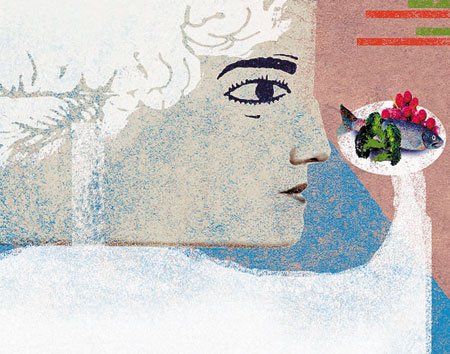Two pounds lost could elate; two gained could discourage. Two
pounds is a fetus at seven months, five Jonamac apples, six Roma
tomatoes. Two pounds is eight sticks of butter or a history
textbook.
Two pounds lost could elate; two gained could discourage. Two pounds is a fetus at seven months, five Jonamac apples, six Roma tomatoes. Two pounds is eight sticks of butter or a history textbook.
Yet, today, we bring you even more – by far the most amazing, versatile, clever, compact, intricate and absolutely best use of 32, give or take a few, ounces.
The brain.
Between 2 and 3 pounds of wonder, it controls everything we say, do or think. Who we are and what we care about. The way we walk or laugh or figure out things. What we like and the talents we possess. How we see and talk and run and jump and process our food.
The brain uses 20 percent of our body’s oxygen and 20 percent of its blood. Somewhere within its protein, fat, 100,000 miles of blood vessels and 100 billion nerve cells, it helps us remember where we put our gym shoes. It regulates our temperature so we don’t succumb to the heat or cold. It speeds us up or slows us down. It helps us choose between peaches or peach cobbler a la mode.
Its intricacies are stunning – far beyond anything most of us can imagine. To keep this work of art as polished as possible, we need to eat right. To exercise. To keep mentally stimulated.
Exercise stimulates a hormone in our brain that aids memory. Good nutrition helps brain cells communicate with each other. Mental stimulation keeps you sharp even as you age.
“It’s very important that we change people so they’re being physically active, mentally active,” says neurologist Malcolm Stewart, medical director of the Human Performance Laboratory at Presbyterian Hospital of Dallas. “The pathology of aging is going on, but you’re able to reduce the damage; you’re able to keep the function up.”
He cites the Nun Study, in which research is being done on nuns well into their 80s, 90s and even 100s. The women eat nutritionally and don’t smoke or drink. They keep physically active and mentally alert by praying, knitting, listening to music, walking, working in their gardens. Upon their deaths, their brains are autopsied.
“They’re riddled with Alzheimer’s, but the nuns didn’t show it in life,” Stewart says.
“They kept active. All this stuff doesn’t prevent the pathology, but it allows you to keep your function. You can’t give that as medicine or as a pill. You have to generate this yourself by what you do or how you are, physically or mentally.”
NUTRITION
n The hypothalamus, at the base of the brain, regulates appetite.
n The frontal lobe, which neurologist Malcolm Stewart calls “the boss,” helps you make choices. Fried rice or steamed? Small milkshake or large?
n Eating poorly contributes to the development of vascular disease, which can have a negative impact on longevity and cognitive functioning, says Dion Graybeal, a neurologist on the medical staff of Baylor University Medical Center at Dallas. These, in turn, supply oxygen and energy to brain cells.
n The brain’s limbic system, which controls emotions, also is involved. This is why someone under stress tends to overeat.
So you should: Avoid fast food. Drink alcohol in moderation. Stewart recommends the Mediterranean diet (www.americanheart.org). “The old adage is: For breakfast, eat like a king; for lunch, like a queen; and for supper, like a pauper.”
EXERCISE
n Exercise increases the activity in the frontal lobe of the brain, Stewart says. “You get the runner’s high; that’s endorphins, your own narcotics in your body. People get addicted; it’s the body’s reward system for exercise.”
n Additionally, the motor system sends a signal that increases the amount of a hormone called brain-derived neurotrophic factor, or BDNF. “It’s like brain fertilizer, or Miracle-Gro, for memory cells,” Stewart says.
n “Research is being done – it has been documented in rats and will soon be in people – that shows physical exercise may be important in helping prevent Parkinson’s disease dementia as well as Alzheimer’s,” says Stewart, who works with patients with both diseases. “I tell everybody they need to become a jock.”
So you should: Do a combination of stretching, aerobic and muscle-strengthening routines. One suggestion: Mix it up. Alternate cardio- and strength-training days for a full-body workout.
MENTAL GAMES
n Staying mentally active and alert, which can keep your brain fit, uses multiple parts of the brain: association areas; higher reasoning and processing regions; visuospatial areas.
n The part of the brain affected by enrichment activities may vary.
n For language-based activities, such as reading, the left side (frontal temporal) is primarily involved.
n For number games such as Sudoku, the right side (parietal area) is involved.
n Listening to music can involve both sides.
So you should: Get six to eight hours of sleep every night, Stewart says. Try to have a sense of hope about the future. Reduce stress by exercising, meditating or praying. Do puzzles. Listen to music. Reach out to others to make their lives better.














